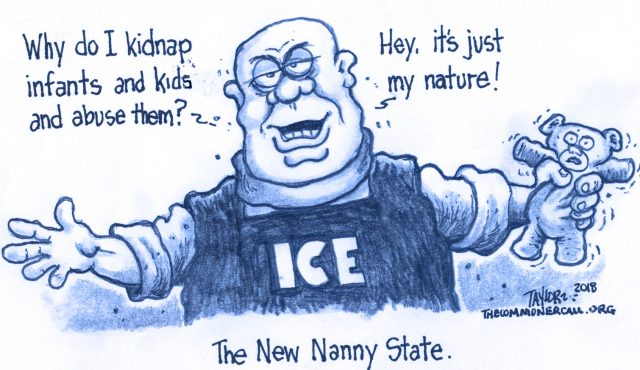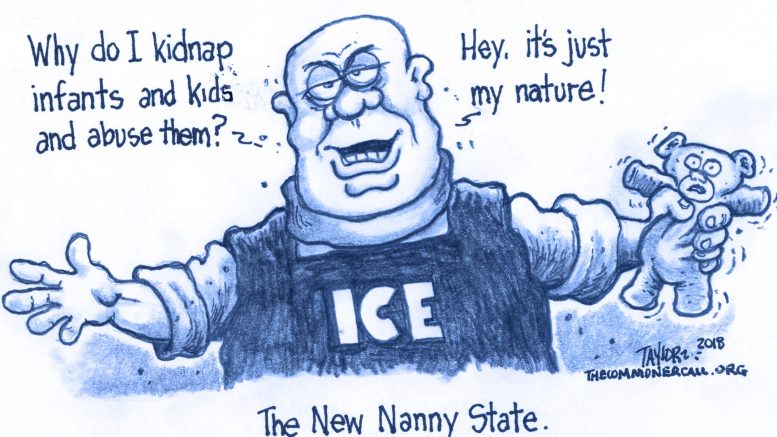
By Michael Grabell & Topher Sanders
ProPublica (7/27/18)
Just five days after he reached the United States, the 15-year-old Honduran boy awoke in his Tucson, Arizona, immigrant shelter one morning in 2015 to find a youth care worker in his room, tickling his chest and stomach.
When he asked the man, who was 46, what he was doing, the man left. But he returned two more times, rubbing the teen’s penis through his clothing and then trying to reach under his boxers. “I know what you want, I can give you anything you need,” said the worker, who was later convicted of molestation.
In 2017, a 17-year-old from Honduras was recovering from surgery at the shelter when he woke up to find a male staff member standing by his bed. “You have it very big,” the man said, referring to the teen’s penis. Days later, that same employee brushed the teen with his hand while he was playing video games. When the staff member approached him again, the boy locked himself in a bathroom.
And in January of this year, a security guard at the shelter found notes in a minor’s jacket that suggested an inappropriate relationship with a staff member.
Kept hidden
Pulled from police reports, incidents like these at Southwest Key’s Tucson shelter provide a snapshot of what has largely been kept from the public as well as members of Congress — a view, uncolored by politics, of troubling incidents inside the facilities housing immigrant children.
Most immigrant youth shelters were never intended to house children long-term. But in recent weeks, the average length of stay has climbed to 57 days from 34 days just two years ago.
Using state public records laws, ProPublica has obtained police reports and call logs concerning more than 70 of the approximately 100 immigrant youth shelters run by the U.S. Health and Human Services department’s Office of Refugee Resettlement. While not a comprehensive assessment of the conditions at these shelters, the records challenge the Trump administration’s assertion that the shelters are safe havens for children. The reports document hundreds of allegations of sexual offenses, fights and missing children.
The recently discontinued practice of separating children from their parents has thrust the youth shelters into the national spotlight. But, with little public scrutiny, they have long cared for thousands of immigrant children, most of them teenagers, although last year 17 percent were under 13. On any given day, the shelters in 17 states across the country house around 10,000 adolescents.
The more than 1,000 pages of police reports and logs detail incidents dating back to the surge of unaccompanied minors from Central America in 2014 during the Obama administration. But immigrant advocates, psychologists and officials who formerly oversaw the shelters say the Trump administration’s harsh new policies have only increased pressures on the facilities, which often are hard-pressed to provide adequate staffing for kids who suffer from untold traumas and who now exist in a legal limbo that could shape the rest of their lives.
“If you’re a predator, it’s a gold mine,” said Lisa Fortuna, director of child and adolescent psychiatry at Boston Medical Center. “You have full access and then you have kids that have already had this history of being victimized.”
Feds mum
Southwest Key wouldn’t discuss specific incidents, but said in a statement that the company has a strict policy on abuse and neglect and takes every allegation seriously. HHS declined ProPublica’s requests to interview the refugee resettlement program’s director, Scott Lloyd. The agency released a statement saying it “treats its responsibility for each child with the utmost care” and has a “zero-tolerance policy for all forms of sexual abuse or inappropriate behavior” at the shelters.
But the reports collected by ProPublica so far show that in the past five years, police have responded to at least 125 calls reporting sex offenses at shelters that primarily serve immigrant children. That number doesn’t include another 200 such calls from more than a dozen shelters that also care for at-risk youth residing in the U.S. Call records for those facilities don’t distinguish which reports related to unaccompanied immigrants and which to other youth housed on the property.
Psychologists who’ve worked with immigrant youth said the records likely undercount the problems because many kids might not report abuse for fear of affecting their immigration cases.
It’s unclear whether any of the children mentioned as victims in the reports were separated from their parents at the border, but the reports include several children as young as 6 years old. …
(Commoner Call cartoon by Mark L. Taylor, 2018. Open source and free for non-derivative use with link to www.thecommonercall.org )
*****
“Brutal And Sadistic”: Noam Chomsky On Abusing Families & The US Roots Of Today’s Refugee Crisis

Democracy Now! (7/27/18)
Federal officials say 711 children remain separated from their parents despite Thursday’s court-imposed deadline for the Trump administration to reunite all migrant children separated from their parents by immigration officials at the border. More than 400 parents have been deported back to their home countries while their children remain in U.S. custody in facilities scattered across the United States. For more on the Trump administration’s family separation policy and the roots of today’s refugee crisis, we speak with world-renowned political dissident, linguist, author and professor Noam Chomsky. Link to Story, Transcript and 17-Minute Video
(Commoner Call cartoon by Mark L. Taylor, 2018. Open source and free for non-derivative use with link to www.thecommonercall.org )
*****
The Immigrant Children’s Shelters Near You
By Decca Muldowney, Alex Mierjeski, Claire Perlman, Lilia Chang, Ken Schwencke, Adriana Gallardo & Derek Kravitz
ProPublica (7/27/18)
Under President Trump’s new “zero tolerance” immigration policy 2,047 children remain separated from their parents, as of June 26. They are now held in shelters and foster homes run by the federal government and an assortment of nonprofit groups. These shelters were already home to an additional 8,886 children who crossed the border unaccompanied by older relatives before the “zero tolerance” policy was announced.
ProPublica is working with partners in the U.S. and in Latin America to fill in gaps in what we know about these facilities, and to tell the stories of the people affected by the zero tolerance policy. More about the map | Español
Use this map to find the facilities nearest you and to help us find out more about them.
*****
Iraqi-American Pediatrician Mona Hanna-Attisha On The Trauma Of Govt. Child Kidnapping, Internment & The Travel Ban
Democracy Now! (7/26/18)
As more than 900 children remain separated from their parents, we speak to Dr. Mona Hanna-Attisha, a pediatrician from Flint, Michigan, who helped expose the dangerous levels of lead in the city’s drinking water after testing blood lead levels in children.The Iraqi-American doctor has just published a new book titled “What the Eyes Don’t See: A Story of Crisis, Resistance, and Hope in an American City.” We talk to Dr. Mona Hanna-Attisha about Trump’s immigration policies, the Muslim travel ban and her family history.
Link to Story, Transcript and 8-Minute Video
*****
‘The Daily’ — The ‘Ineligible’ Families
The Daily / New York Times (7/27/18)
As it raced to meet a deadline for reunifying parents and children separated at the border, the Trump administration deemed hundreds of parents “ineligible.” What does it mean to be ineligible to be reunited with your own child? Guest: Caitlin Dickerson, who covers immigration for The New York Times. For more information on today’s episode, visit nytimes.com/thedaily

